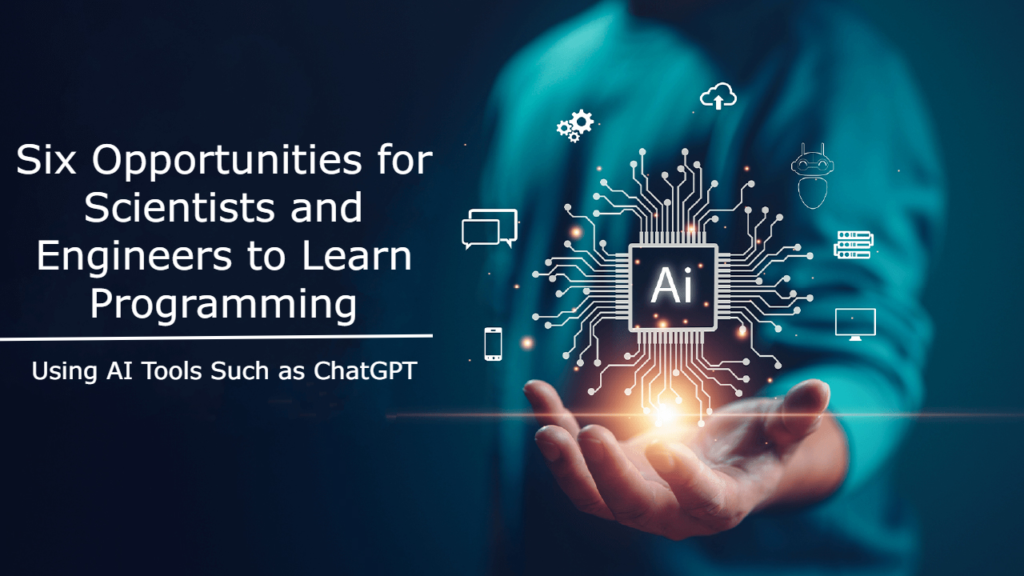Six Opportunities for Scientists and Engineers to Learn Programming Using AI Tools Such as ChatGPT
- Akcharahttps://morning9.com/author/akchara/
- Akcharahttps://morning9.com/author/akchara/
- Akcharahttps://morning9.com/author/akchara/
- Akcharahttps://morning9.com/author/akchara/

In today’s scientific and engineering advancement era, AI technologies are revolutionizing how researchers approach programming and data analysis tasks. Here are some opportunities where AI tools like ChatGPT are making a significant impact: personalized tutorials tailored to specific domains, assistance learning complex data visualization libraries and new programming languages, refactoring and understanding legacy code, and challenging assumptions in scientific coding practices. These tools not only expedite learning and enhance productivity but also encourage deeper critical evaluation, fostering innovation and improving code quality across scientific disciplines.
OPPORTUNITY 1: Using AI to Create Customized Programming Tutorials for Your Domain
Harnessing AI tools to create personalized programming tutorials tailored to specific scientific or engineering domains is paramount. Traditional tutorials often use generic datasets such as “iris” or “mtcars,” which may lack relevance to learners outside those fields. For example, a geologist learning Python could benefit from tutorials using geological survey data rather than standard datasets like flower measurements or car specifications.
OPPORTUNITY 2: Using AI to Learn Complex Data Visualization Libraries
Scientific programmers frequently navigate intricate data visualization tasks. AI can simplify learning complex libraries like Matplotlib or ggplot2 by generating tutorials that align with specific research needs. For instance, a marine biologist aiming to visualize biodiversity trends could receive tailored tutorials on creating dynamic scatterplots that differentiate fish species by color, shape, and size.
OPPORTUNITY 3: Refactoring Exploratory Code into Maintainable Software
In scientific research, initial exploratory code often evolves into long-term solutions requiring clarity and maintainability. AI can assist by analyzing code structures and recommending improvements. For example, AI tools can suggest refactoring options such as modularizing analysis scripts or standardizing variable naming conventions, enhancing code readability and sustainability.
OPPORTUNITY 4: Understanding Inherited Legacy Code
Scientists frequently inherit complex legacy codes from previous researchers. AI tools can aid by providing detailed explanations and supplementary documentation to demystify inherited codebases. For example, when inheriting climate modeling algorithms, AI can clarify the logic behind temperature variance calculations, facilitating quicker adaptation and modification for new research purposes.
OPPORTUNITY 5: Learning New Programming Languages on Demand
Adapting to new programming languages is crucial in scientific endeavors where specific libraries or tools may necessitate rapid skill acquisition. AI can expedite this process by translating example code snippets between languages. For instance, a bioinformatician needing to implement genetic sequence analysis in Julia can utilize AI to translate existing Python scripts into Julia syntax, accelerating the learning curve within their existing computational workflow.
OPPORTUNITY 6: Questioning Assumptions in Scientific Code
Ensuring scientific code aligns with accurate assumptions is critical for reliable research outcomes. AI tools can serve as critical evaluators, prompting researchers to justify algorithmic choices and statistical methods. For example, AI can question the rationale behind statistical tests chosen for genomic data analysis, promoting deeper scrutiny of scientific hypotheses and ensuring robust methodological integrity.
Conclusion
AI tools like ChatGPT present significant opportunities for scientists and engineers to enhance their programming proficiency and streamline research workflows. By leveraging AI’s capabilities alongside human expertise, researchers can optimize coding practices, accelerate learning of new technologies, and foster rigorous scientific inquiry.
Reference: https://ieeecs-media.computer.org/media/marketing/cedge_digital/ce-jul24-final.pdf
Program iz I’m often to blogging and i really appreciate your content. The article has actually peaks my interest. I’m going to bookmark your web site and maintain checking for brand spanking new information.
Newtoki I do not even understand how I ended up here, but I assumed this publish used to be great